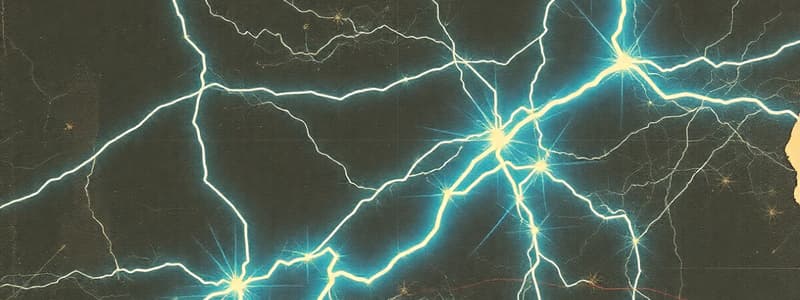Podcast
Questions and Answers
What distinguishes current electricity from static electricity?
What distinguishes current electricity from static electricity?
- Current electricity is a controlled flow of electrons. (correct)
- Current electricity involves the buildup of charges on surfaces.
- Static electricity involves the steady flow of electrons.
- Static electricity flows continuously through conductors.
What happens to the flow of electrons when a battery is dead?
What happens to the flow of electrons when a battery is dead?
- Electrons flow intermittently.
- Electrons cease to flow. (correct)
- Electrons start flowing backwards.
- Electrons continue to flow unrestricted.
Which of the following best describes a material used to prevent current from flowing?
Which of the following best describes a material used to prevent current from flowing?
- An insulator that restricts electron movement. (correct)
- A superconductor with no resistance.
- A semiconductor that regulates flow.
- A conductor that allows easy flow of electrons.
What is a primary source for making electrons move in a circuit?
What is a primary source for making electrons move in a circuit?
What is the effect of having insulation on electrical wires?
What is the effect of having insulation on electrical wires?
How does the movement of electrons differ in static electricity compared to current electricity?
How does the movement of electrons differ in static electricity compared to current electricity?
What type of material is commonly known as a good conductor of electricity?
What type of material is commonly known as a good conductor of electricity?
During a power outage, what happens to electrical devices?
During a power outage, what happens to electrical devices?
Flashcards
Current Electricity
Current Electricity
The controlled flow of electrons through a conductor.
Static Electricity
Static Electricity
The buildup of electric charges on a surface, which can be discharged suddenly.
Electrons in Motion
Electrons in Motion
Electrons are always moving, but their motion is random in static electricity and controlled in current electricity.
Electrostatic Discharge
Electrostatic Discharge
Signup and view all the flashcards
Conductors
Conductors
Signup and view all the flashcards
Insulators
Insulators
Signup and view all the flashcards
Copper
Copper
Signup and view all the flashcards
Plastic
Plastic
Signup and view all the flashcards
Study Notes
Introducing Current Electricity
- Electricity is essential in daily life, powering most appliances.
- Electricity flows through conducting wires.
- Static electricity involves charges building up on surfaces until discharged.
- Lightning is an example of static discharge, involving charges moving between clouds or the ground.
- Current electricity involves a controlled flow of electrons.
- Electrons are always moving, unlike static charges.
- In static electricity, electrons gather in one place, moving randomly.
- In current electricity, electrons flow steadily in a conductor.
The Flow of Electrons
- Electrons constantly move.
- The controlled flow of electrons is current electricity.
- The difference between static and current electricity is the direction of electron movement.
- In static electricity, electrons move randomly.
- In current electricity, electrons move in a controlled, steady flow.
Making Electrons Move
- Electronic devices require a power source (e.g., batteries or wall outlets) to make electrons flow.
- A fully charged battery allows electrons to flow, powering the device.
- A dead battery prevents electron flow, rendering the device inoperable.
- Electric generating stations produce electrons for devices plugged into a wall outlet.
- A power outage stops electron flow, causing devices to cease operation.
- Electrons need energy to move.
Studying That Suits You
Use AI to generate personalized quizzes and flashcards to suit your learning preferences.




